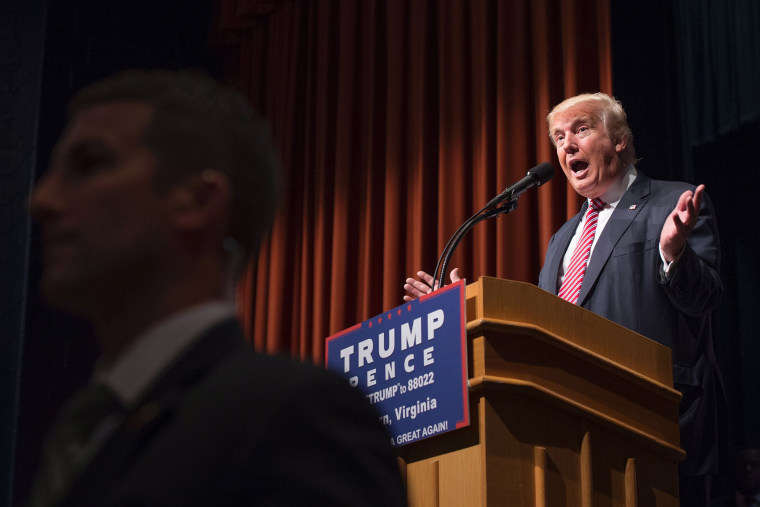Perhaps no issue has defined Donald Trump's presidential candidacy as much as his hardline stance on immigration. The Republican nominee, embracing the kind of nativism modern national candidates have generally avoided, has seemingly gone out of his way to alienate immigrants and their allies with talk of mass deportations, bans, and walls.
With that in mind, it's something of a surprise to suddenly hear some mixed signals from Team Trump on the matter. The Washington Post reported this morning:
Donald Trump's campaign wavered Sunday on whether he would continue to call for the mass deportation of 11 million illegal immigrants from the United States, the latest in a series of sometimes-clumsy attempts to win over moderate GOP voters without alienating millions who have flocked to his hardline views. After insisting for more than a year that all illegal immigrants "have to go," Trump met with a newly created panel of Hispanic advisers on Saturday and asked for other ideas -- making clear that his position is not finalized, according to two attendees.
To be sure, there's been no explicit shift from the candidate, and there are no exact quotes from Trump's weekend gathering with Hispanic advisers.
Last November, however, Trump said on MSNBC that he would use "a deportation force" to round up 11 million undocumented immigrants. Yesterday, when CNN's Dana Bash asked Trump's campaign manager, Kellyanne Conway about whether or not "a deportation force" is part of the candidate's plan, Conway replied, "To be determined."
Around the same time, Sen. Jeff Sessions (R-Ala.), a Trump confidant and prominent anti-immigration voice on Capitol Hill, appeared on CBS's "Face the Nation" and was asked about Trump' deportation plans. "He's wrestling with how to do that," the Alabama Republican said.
On "Fox & Friends" this morning, Trump himself insisted, "No, I'm not flip flopping. We want to come up with a really fair, but firm answer. It has to be very firm. But we want something fair."
I don't know what that means. I'm reasonably confident Donald Trump doesn't know, either.
The oddity, of course, is that Trump has been running for president for 14 months, during which time he's talked about his immigration plans countless times. In each instance, the far-right has been delighted with the candidate's extremist position. Now, however, he still wants to "come up with" a position he considers "fair but firm"?
In Trump's mind, hasn't he already done this?
Some Trump campaign officials insist that there's been no change, despite the confusion. But if the GOP nominee does try to scale back his position, he and his team should realize that the reaction won't be kind from the right -- which has embraced Trump largely as a result of the uncompromising immigration position that's suddenly in doubt.
A shift is also unlikely to persuade his critics on the left, which have voluminous evidence of Trump's aggressive, anti-immigrant positions. It's simply too late to unring the bell Trump has been hammering for over a year. (If the goal is to appeal to moderates, the same dynamic applies. Trump has already defined himself; few will believe him if he puts on a mainstream mask.)
As NBC's First Read put it this morning, "[H[ere's why it's so hard -- if not impossible -- for Trump to retreat on immigration: He's caught between his clear, unambiguous past statements and a base that might not [be] willing to see him moderate on the issue."
